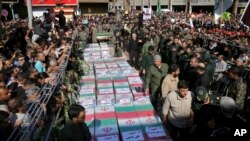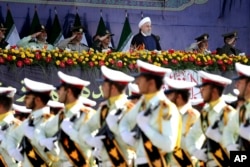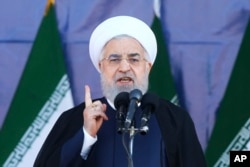The Islamic State (IS) terror group claimed responsibility for Saturday’s attack on a military parade in Iran's southwestern city of Ahvaz, but Iranian officials continue to accuse Saudi Arabia and the U.S. for being behind the attack.
The group's media wing, Amaq, released a new video Monday in which the terror group shows three individuals driving in a vehicle and vowing to attack "infidels" in Iran.
The group claims that the three individuals shown in the video carried out Saturday’s shooting in Ahvaz, killing at least 25 people and injuring more than 65 others.
In the video, two of the assailants speak in Arabic while the third speaks Farsi.
The attack targeted a military parade commemorating the anniversary of the 1980-1988 Iran- Iraq war.
VOA could not independently verify the authenticity of the video.
Iran has not immediately reacted to the IS statement about the video, but Iranian officials continued to accuse the U.S. and Saudi Arabia of fomenting unrest in the country.
Iranian Supreme Leader Ayatollah Ali Khamenei on Sunday accused U.S.-backed regimes in the region to being behind the terror attack in Iran.
During a public event held Monday, Khamenei specifically accused Saudi Arabia and the United Arab Emirates (UAE), saying, "The attackers were paid by Saudi Arabia and the United Arab Emirates."
Before departing for New York to attend the United Nations General Assembly, Iranian President Hassan Rouhani on Sunday accused the U.S. of providing support to the attackers.
"It is Americans who instigate them and provide them with the necessary means to commit these crimes," Rouhani said of the attackers. "All of those small mercenary countries that we see in this region are backed by America."
US reaction
U.S. officials condemned Saturday’s terror attack in Iran, but rejected allegations the U.S. was behind it.
U.S. Ambassador to the U.N. Nikki Haley condemned the attack but rejected Rouhani’s comments.
"He has oppressed his people for a long time and he needs to look at his own base to figure out where that's coming from," Haley told CNN on Sunday. "He can blame us [the U.S.] all he wants. The thing he's got to do is look in the mirror."
U.S. Secretary of State Make Pompeo also pushed back against the Iranian accusations on Sunday during an interview with Fox News.
"When you have s security incident at home, blaming other[s] is an enormous mistake," Pompeo told Fox News Sunday in a response to Iranian Foreign Minister Mohammad Javad Zarif, who in a tweet accused Gulf countries and the U.S of carrying out the attack.
Anwar Gargash, UAE’s minister of state for foreign affairs, also rejected Iran’s claims as baseless.
"UAE’s historical position against terrorism and violence is clear and Tehran's allegations are baseless," Gargash tweeted Sunday.
Backlash
While Iranian officials attempt to blame outsiders for the attack, some analysts believe the attack could be a backlash of Iran’s oppression against religious and ethnic minorities in the country.
"They [IS] have chosen Ahvaz because of its ethnic mix, wanted to fuel chaos and use the ethnic sectarianism in their favor," Soraya Lennie, an Australian-Iranian journalist and counterterrorism analyst, told VOA.
Sina Azodi, a researcher at the University of South Florida’s Center for Strategic and Diplomatic Studies, echoed Lennie’s assessment that the attack was a signal and a backlash.
"I think by conducting the attack on a symbolic day of commemorating the Iran-Iraq war, and by choosing the specific city of Ahvaz because of the presence of a large Arab minority, they wanted to send a signal," Azodi said.
A Tehran-based analyst with knowledge of domestic developments in Iran, who spoke on condition of anonymity because of fears that authorities may target him, said the attack should not come as a surprise to anyone.
"IS have always conducted attacks inside countries using local proxies and malfunctioning communities. Increasing negligence [by the regime] of ethnic groups and their demands will serve as a Trojan Horse for terror groups to carry out attacks," the analyst said.
Ahvaz, the capital of Khuzestan province, where Saturday’s attack occurred, was heavily damaged during the Iran-Iraq war in the '80s and the government has not done much to reconstruct it.
The province, home to large number of Arab minorities and Sunnis, has some of the highest crime and unemployment rates.
In recent months, people launched several protests in the province, some of which resulted in clashes with government forces over air pollution, dust storms, unemployment and water shortages in the province.
Retaliation
Iran has been fighting IS through its regional allies and proxies in the region and some analysts charge that the recent attack is a retaliation by IS.
"IS has always considered Iran as its No. 1 enemy due to its systematic oppression of Sunni Muslims and its role in counterweighting IS in Iraq and Syria," Karim Pourhamzavi, an analyst at Macquarie University in Sydney, told VOA.
"They [IS] would not hesitate to attack Iran whenever they have an opportunity," Pourhamzavi added.
Shabbir Hussain Turi, a Lahore-based analyst, agrees with Pourhamzavi's assessment and charges that the attack could be viewed as a retaliation by IS because Iran played a role in cracking down on the terror group in other parts of the region.
"Iran Shiite state played a major role in ousting IS in Syria and Iraq, and IS would take advantage of any chance to attack Iran as they did last year," Turi said.
Turi was referring to an incident last year when two IS cells simultaneously carried out a twin attack in Tehran against the Iranian parliament building and the Mausoleum of Ruhollah Khomeini, the founder of the Islamic Republic. Seventeen civilians were killed in the attack, and 43 others wounded.
Iran has not yet offered any evidence to support its recent accusations, but the country’s minister of intelligence, Seyed Mahmoud Alavi, announced Monday that his agency has arrested at least 22 suspects in connection with Saturday's attack.
Some analysts charged that the regime would likely use torture against the detainees, forcing false confessions.
"Security forces will force some of the convicts into confessions to say things that they have been ordered, trained and sponsored by either Saudis, Emirates or even Israelis," Ramyar Hassani, a Norway-based Iranian exiled analyst, told VOA.






